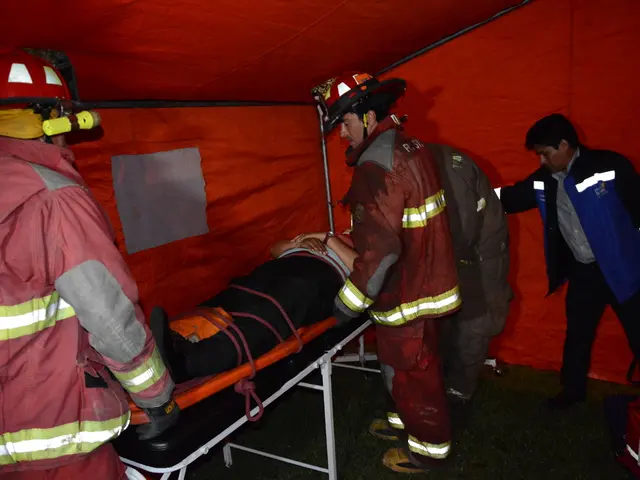MRSA dissemination: Methods of spread, protective measures, and additional insights
Living with MRSA, the Resistant Superbug
Sporting the unwanted tag of a 'superbug', Methicillin-resistant Staphylococcus aureus (MRSA) is a strain of bacteria that has developed a knack for dodging common antibiotics. While its presence in our bodies might seem threatening, not all cases pose an immediate threat. This situation is known as MRSA colonization, where the bacteria reside on or in our bodies, generally without causing any noticeable symptoms.
MRSA loves to hide out in moist, warm areas, such as your:
- Nose
- Throat
- Underarms
- Groin
- Skin folds
- Perineal area
Although it might be a cause for concern among healthcare professionals, MRSA colonization doesn't necessarily call for an alarm, as long as you're not experiencing symptoms. However, it's vital to remember that as carriers of MRSA, we unwittingly contribute to its spread, often leading to infections, particularly within healthcare settings.
MRSA presents a cause for worry because it's resistant to various common antibiotics, such as methicillin, penicillin, amoxicillin, and oxacillin. In turn, treating MRSA infections can be a challenge, potentially leading to more severe complications in vulnerable individuals.
Spreading MRSA is as easy as breathing, and it can happen through:
- Close contact with individuals contaminated by MRSA
- Sharing equipment or supplies that haven't been properly cleaned
- Environmental contamination of household surfaces
When our immune systems weaken, or we develop wounds, colonization can morph into infection. To avert such scenarios, sticking to basic hygiene practices is crucial:
- Regular hand washing and showers with antiseptic soap
- Keeping wounds clean and covered
- Avoiding shared personal items like towels, razors, clothing, and bedding
- Washing clothes, sheets, and towels in hot water and drying on high heat
- Regularly disinfecting surface areas
In medical settings, medical professionals might screen for the presence of MRSA bacteria, especially before a surgery. If detected, they may prescribe a nasal cream or spray, body wash, and shampoo for a few days.
Although MRSA colonization usually doesn't require treatment, it's essential to stay vigilant and keep an eye out for signs of skin infection, especially around cuts or abrasions. Red flags include:
- Pain
- Redness
- Pus
- Swelling
- Areas feeling warm to the touch
By practicing good hygiene at home and in medical settings, we can contribute to controlling the spread of MRSA and avoid infections.
Want to know more? Learn more about MRSA:
- Can MRSA go away on its own?
- Does chlorine kill MRSA?
- Will I always carry MRSA bacteria?
[1] Dalbavancin for treatment of bacterial skin and skin structure infections: A systematic review and meta-analysis. Antimicrob Agents Chemother. 2014 Jan;58(1):41-8. doi: 10.1093/aac/dku359. Epub 2013 Oct 21. PMID: 24136253.[2] van den Bempd EJ, Vergnaud MH, van den Broek P, Lemos MP, Torres-Acosta A, Alvy BM, Sliwa KP, Lyon AR, Chambers HF, van Duijvendijk P, Oppegaard RM, Roberts ID, Popovich MA, Brown E, Brown CG, Warren T, Lytle BW, McManus MJ. International clinical practice guidelines for the management of skin and soft tissue infections. Clin Microbiol Infect. 2019 Jan;25(Suppl 1):e8-e18. doi: 10.1016/j.cmi.2018.10.005. Epub 2018 Oct 24. PMID: 30377836.[3] Goetz JA, Ramirez G, Kollef MH. High-dose vancomycin for the treatment of skin and soft tissue infections: characterization of the population, treatment course, and outcomes of clinical trials. J Antimicrob Chemother. 2014 Aug;70(2):268-76. doi: 10.1093/jac/dku505. Epub 2014 Jul 4. PMID: 24990130.[4] Fox CP, Himelstein B, McGrath CJ, Reavill EJ, Moore EC, Kirschner PR. Clinical and bacteriologic data from a study of dalbavancin in patients with skin and skin structure infections (SKIN-1-005): a randomised, double-blind, multicenter, non-inferiority study. J Antimicrob Chemother. 2015 Nov;70(5):1355-64. doi: 10.1093/jac/dku282. Epub 2015 Aug 25. PMID: 26319597.
- Science has been continually researching ways to combat superbugs, such as MRSA, due to its resistance to common antibiotics like methicillin and penicillin.
- Chronic diseases and various medical-conditions are increasingly becoming a concern as more individuals carry the MRSA bacteria without experiencing symptoms.
- Advent of cancer, respiratory-conditions, digestive-health issues, and even eye-health complications might be worsened by weakened immune systems struggling to fight off MRSA infections.
- The hearing ability of individuals might be affected if MRSA infections spread to the ear, necessitating appropriate therapies and treatments.
- A healthy lifestyle and taking care of one's health-and-wellness are key to preventing MRSA infections, which can benefit from regular fitness-and-exercise and proper nutrition.
- Individuals with autoimmune-disorders might experience more severe complications if they contract MRSA due to their weakened immune systems.
- Climate-change poses a risk to our overall health, including our skin health, by leading to conditions conducive for the growth and spread of bacteria such as MRSA.
- The mental-health implications of living with a condition like MRSA can be substantial, necessitating mental health support and resources.
- Skin-care is crucial in preventing the spread of MRSA, as it can thrive on skin surfaces and enter the body through cuts, abrasions, or open wounds.
- Environmental-science plays a vital role in understanding the impact of MRSA on our ecosystem and the potential sources of exposure to the bacteria.
- In treating MRSA infections, various skin-conditions like eczema or psoriasis might be exacerbated or made more resistant to traditional treatments, warranting careful consideration and coordination of care.








